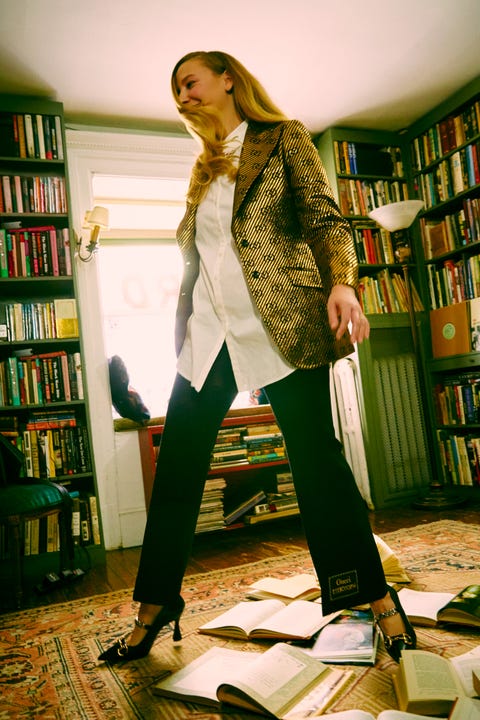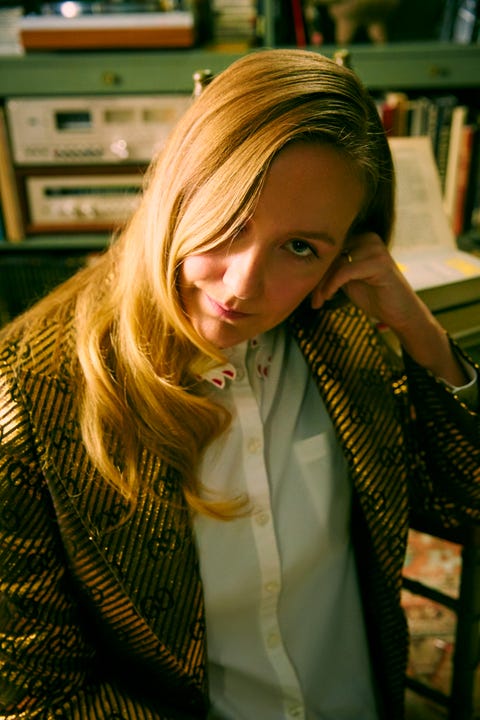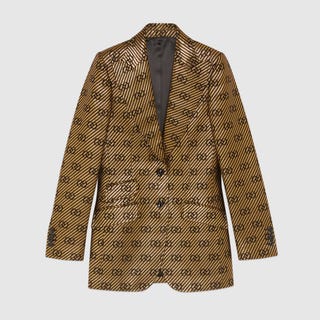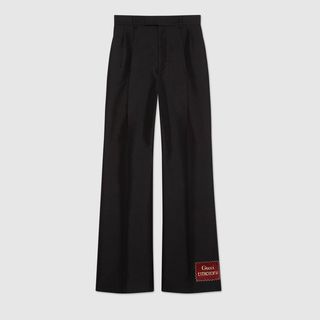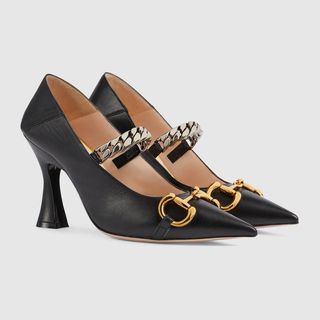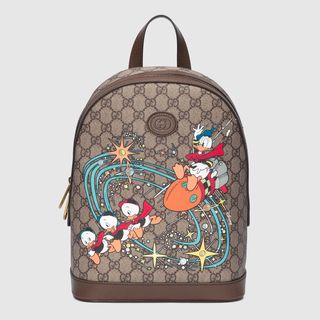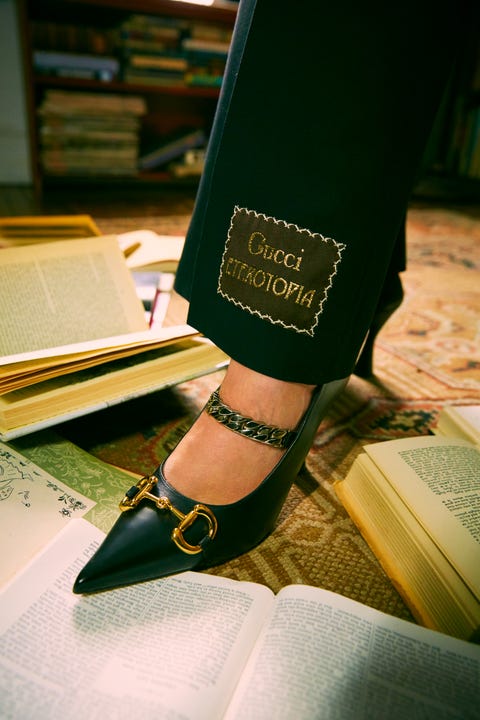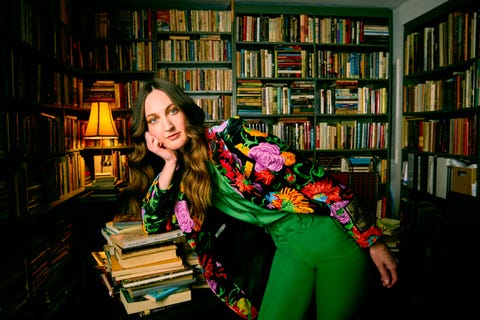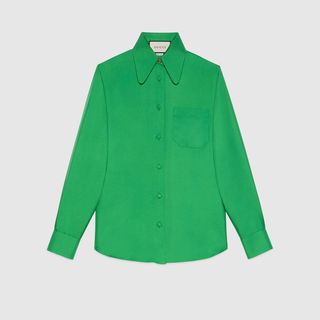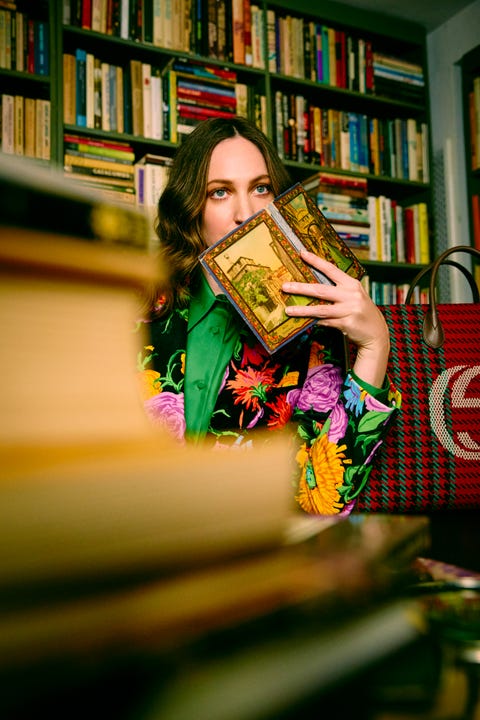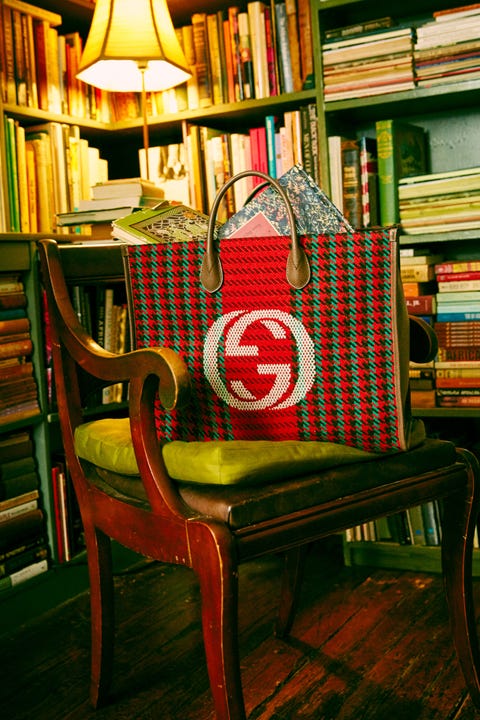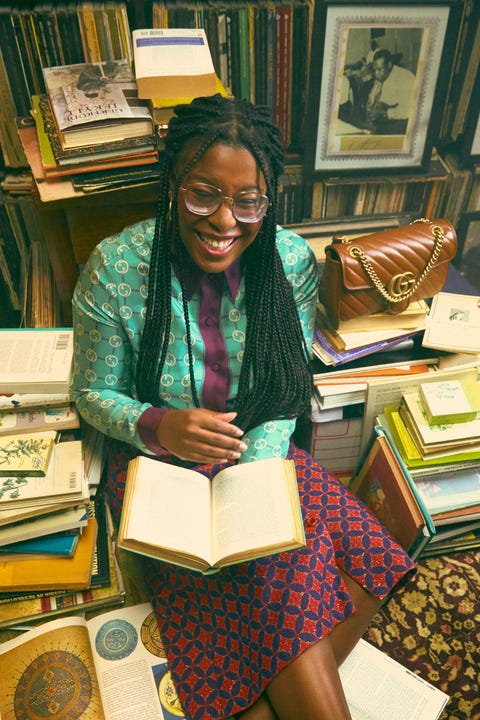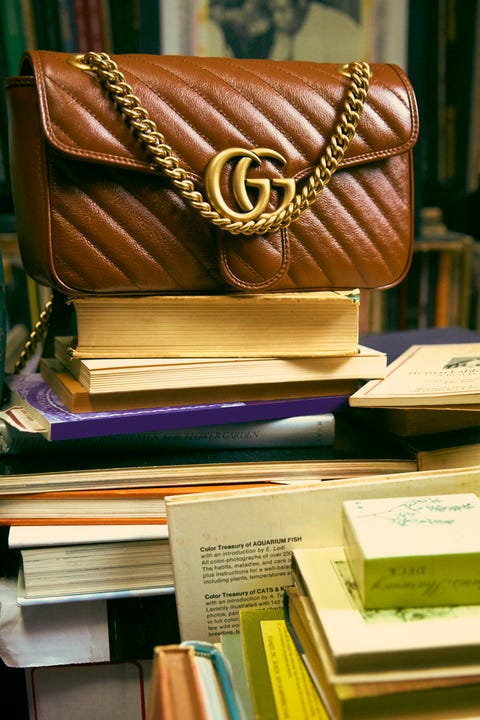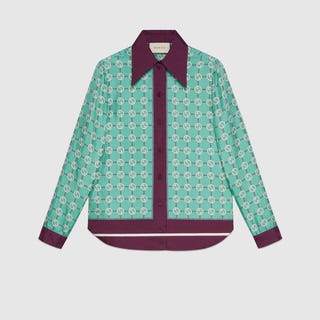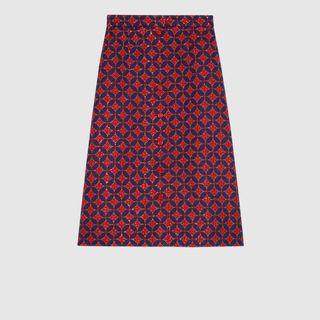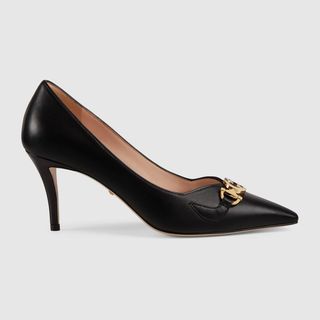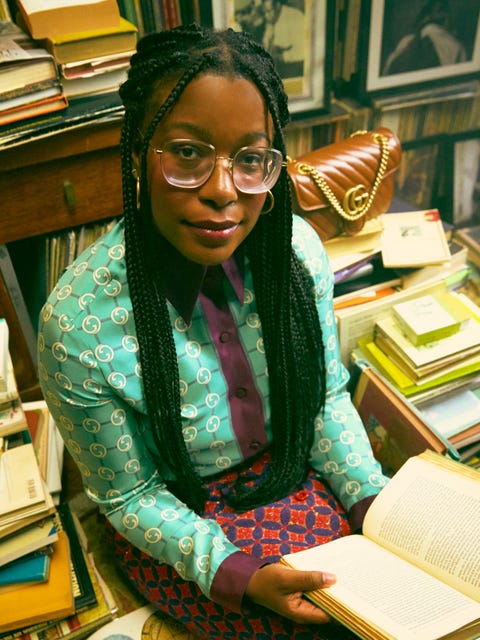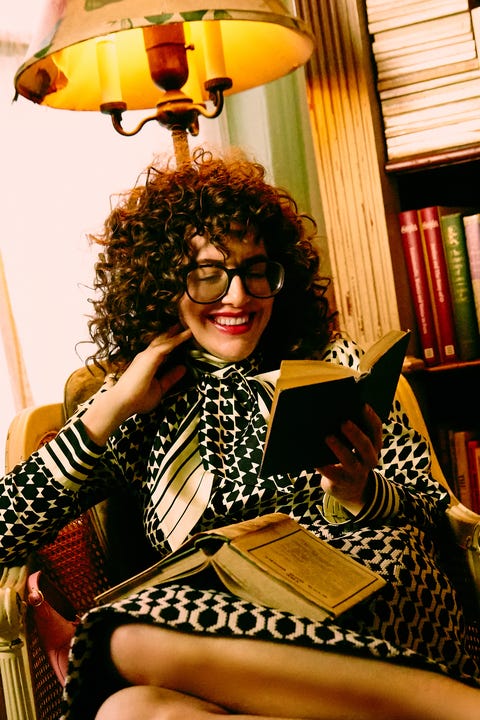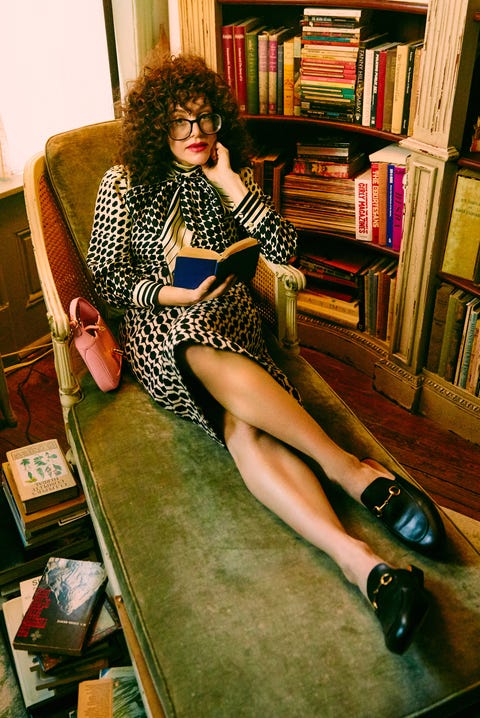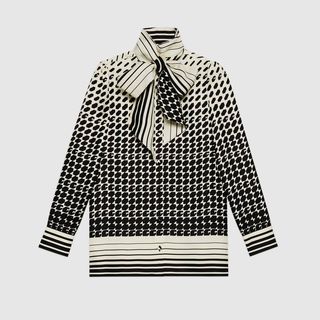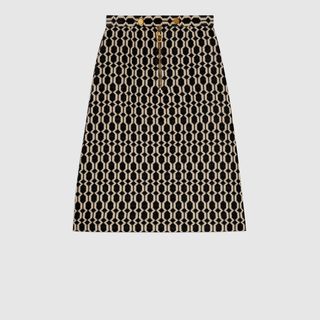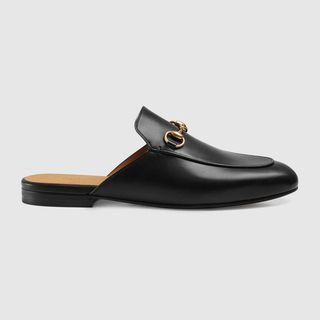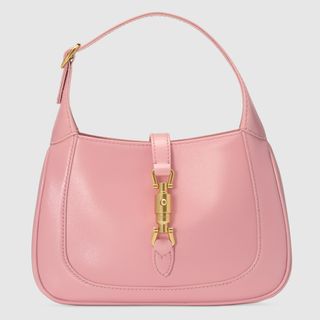A rural courthouse in depression-era Georgia. An English countryside estate during the Regency Era. A dreary castle set on the cliffs of Transylvania. Books have a near-mystical power to transport the reader to undiscovered places and bring unfamiliar characters to life. They open a window to the author’s mind and create opportunities to understand the world from someone else’s perspective. A relationship with literature is marked by curiosity, empathy, and imagination and for the four bibliophiles below, reading is a lifelong commitment.
Picking the brain of a true bookworm is always a good idea, particularly if that individual happens to be Payton Cosell Turner, Eliza Wexelman, Roxanne Fequiere, or Sadie O. Stein. Despite their filled-to-the-brim schedules including, respectively, running an online journal, book clubs, a custom-library company, and writing essays for established publications, all four sat down with ELLE to discuss why achieving the descriptor of “well-read” is a worthy pursuit.
Payton Cosell Turner and Eliza Wexelman co-founded GAL (Girls at Library) back in 2015. It’s an online journal that features literary interviews with a diverse, inspiring range of women—along with plenty of book recs. If you’ve ever wondered what to read if you have dead-of-winter existential dread or are curious how your favorite female figures organize their bookshelves, you owe yourself a subscription to GAL. On top of running the journal, Turner is an artist, designer, and co-founder of a wallpaper and fabric design studio. Wexelman is a graphic designer. Together, the two amplify and uplift female voices who all share a passion for the written word (including this article, created in thoughtful collaboration with GUCCI and GAL).
Roxanne Fequiere is a native New Yorker and currently resides on the Upper West Side (a neighborhood that writers James Baldwin, Philip Roth, and Nora Ephron have called home). She is a multidisciplinary writer who’s penned articles for a myriad of outlets, including ELLE.com and GAL, where she is a regular contributor.
Sadie O. Stein has been an editor at The Paris Review, written about the mysteries of Agatha Christie, humorously proposed an ending to the war on brunch, and, with her husband, launched a personal book-shopping company—S.O.S. Libraries. Her more recent work includes the text for the book Bibliostyle: How We Live at Home With Books, which gave her the unique opportunity to visit dozens of private libraries around the world. She also helps curate the old and rare book room at McNally-Jackson in City Point, Brooklyn. You might say literature is the common thread in everything Stein does. It’s this fervent dedication to books that makes her such a compelling person to ask the question: What are you reading right now?
Ahead, the four bona fide bookworms share their thoughts on what it means to be well-read, the importance of reading widely, and how literature impacts how they live.
ELLE: How do you choose the books you read?
Payton Cosell Turner: I like to roam the aisles of bookstores, ask librarians for recommendations, or research specific topics to find books. GAL is a great resource, too! If I love an author, I’ll do my best to figure out what they’re reading or what books may have inspired theirs, or resort to an algorithm to show me similar books. The algorithm isn’t always helpful. Librarians, bookstore employees and owners, friends, and my mom are a much more fruitful way to discover books I might enjoy.
Eliza Wexelman: Friends are definitely a big influence—they cover the whole gamut of literary genres. I go to each for something specific, or for a surprise. My friend Hayley for the witty, clever, and thought-provoking. Payton for critical thinking or just really excellent writing. Books I wouldn’t immediately be drawn to I then come to love. My friend Monica for introspective writing and design. I cannot lie though, also Instagram. People always share what they are reading and that gives so many different perspectives. I love it when people are passionate about books—love and hate the book kind of passion. I also love finding books through research, so I definitely choose what to read next after becoming a bit obsessive about a topic and just digging in. Researching authors and what they research has always been one of the best ways of getting me into what to read next. I think just readers, in general, are who I look to for recommendations.
Roxanne Fequiere: I think in the last couple of years or so, just by virtue of running a book club that I co-chair with Payton, I’ve been more attuned than I typically used to be to new releases and new voices and making sure I read stuff that’s new and relevant and getting buzz. I also love walking around a bookstore, whether it’s a rare book or vintage bookstore or [a chain store] or Strand, and letting the covers speak to me and draw me in. Also, if I really like an author sometimes I will just start from the beginning and see if I can make my way through their entire work.
Sadie Stein: At any given moment, I have a long list of books I want to read; a list and also a literal pile! It’s a combination of books for writing work, recommendations, gifts from friends, things that were suggested by the other things I was reading, stuff I saw at the library, and then others I’ve run across while sourcing books for other people, or for the rare book room I help curate, that were just too enticing–like yesterday, I came across this falling-apart old book called Ghosts I Have Met, so obviously now everything else is on hold while I read that!
ELLE: What was the first book you fell in love with?
PT: I loved anything that was a saga or series when I was old enough to have my own library card. The Narnia series, The Baby-Sitter’s Club series, the Betsy-Tacy series, anything by Madeleine L’ Engle (so many of her novels are intertwined). I have extremely visceral memories of reading The Heart is A Lonely Hunter by Carson McCullers.
EW: I think the first book I remember reading and loving was A Tree Grows in Brooklyn. I remember it being magical and moving and really taking me out of my life and into someone else’s. I must have read it in middle school or early in high school. I still haven’t reread it but I have a copy because it was the first book Payton and I swapped. I think most books we lent to each other were never returned, on both ends!
RF: My memories with reading begin with being read to and being taught to read by my mom. I remember really early on going to the library every week and taking home stacks of books, there are so many books for young readers that have such visceral memories for me, like Arnold Lobel’s Frog and Toad. I have such solid memories of enjoying them so deeply and re-reading them over and over again. I think it’s tough for me to settle on just one.
SS: I don’t remember a time when I didn’t love to be read to. When I was very little, I always liked books that took place in New York settings that I recognized: How Little Lori Went to Times Square, The Snowy Day, Lyle Crocodile, or the laundromat in Corduroy. I think 9 to 12 is kind of the golden age for reading, that’s when you really fall in love. Series or books like Island of the Blue Dolphins, Sounder, Harriet the Spy were really formative. I still love to be read to—my husband reads to me most nights!
ELLE: Why, to you, is it important to read widely?
PT: Reading widely opens the door to an empathetic and deep understanding of lives, people, traditions, experiences, and histories that aren’t your own. Sometimes you see yourself, or parts of yourself mirrored back to you, providing a new and vivid understanding of yourself and your life. Other times, diving into a world that is unlike anything you yourself have lived will broaden your own world in less obvious ways, which you might not fully understand until the book is finished. Maybe not until years after the book is finished!
EW: This is super important because I read to learn; and in order to learn there has to be diversity. I think if you’re not opening yourself up to other ways of thinking it can be challenging to understand other perspectives. This is not to say one has to agree with or take on the other perspective, but [it’s about] being open.
RF: I read widely as a youngster because I was very shy and sheltered growing up. Reading was my way of seeing the world and thinking about a way of being that was different from my own. Reading has always felt like a way for me to expand my horizons. Obviously, as I’ve gotten older, it blows my mind sometimes to think about the canon and how narrow it really is and how long I was taught as an English major that these are the books that matter, and to think about how many voices have been left out for so long. The canon, as it stands, never addressed my life experience but I was taught that it was supposed to be the only thing worthy of deep study. Reading widely came to me naturally, but now it’s the most important thing because to exclude any voices from what we consider to be our canon is purely erasure.
SS: It’s an actual way to engage with other perspectives and voices. That’s enriching but valuable even when it’s infuriating—maybe especially then. And after formal school ends, it becomes easier (for me at any rate) not to challenge yourself in the same ways, to just read things that are comforting, or fun, or reassuring about your views and world. And I do love that! But challenging myself is important too.
ELLE: Where do you like to read?
PT: It changes seasonally. Right now, while soaking in a very hot bath or curled up tightly in one of the squashy chairs by my fireplace, usually with my cat Bovine sleeping on one arm of the chair. Saying this feels cozy, but I’m also reminded of how much I love to stretch out on a warm towel and read on the beach. Or outside in early spring when the earth has thawed. But I have to be careful because I might look up from my book and see some weeds that need to be weeded, then feel obligated to go and pull them. I guess I prefer a multi-sensory experience. Reading in bed is nice too.
EW: It may sound odd, but I prefer to read in public spaces; public transportation (planes, trains, etc), or in cafes and restaurants. I feel like there could be three explanations for this that I can think of—getting lost in a story and forgetting everything around you, that’s magical. Or, getting lost in a story and looking up to see several others play out in front of you. Or not being able to focus on controlling the environment around me makes it easier for me to concentrate and creates space to get into a story.
RF: I love reading in bed under a blanket or curling up in a corner. I have this romantic vision of myself sitting in a window sill reading but I’ve never had a sill that’s big enough—I just want a bigger window! In my current apartment over the summer, I tried to get good about going out on my fire escape and reading, which was quite lovely. Again, forcing that romance. I also love reading in cars or on commutes. As a kid going on road trips or vacations I would bring a suitcase of books and plow through them, so I still love to do that when I’m on the road.
SS: I used to read on the subway, which I miss! Now, in a big armchair in the living room, or before bed with a special configuration of pillows. When I read stories to my baby, we always sit in this rocking chair his grandparents gave us. I carry a book wherever I go, though. Even though there’s far less need for it these days, I still get antsy at the possibility of getting stuck somewhere without something to read, and I have some very small books which will fit in even my tiniest purses. Yesterday I ended up in a line for a rapid COVID test that lasted more than two hours, and I was so relieved to have my mystery!
ELLE: Is there a book you’d strongly prefer never to read again?
PT: One Flew Over the Cuckoo’s Nest and every other over-read and overrated book by white male authors that was stuffed down my gullet during high school and college.
EW: There are books I have stopped reading, a lot of them are classics. It sometimes becomes difficult to read even the best books when there are blatant undertones of racism and/or xenophobia. It’s one thing to put their situation into perspective but it is challenging for me to read those books, and I’ve honestly tried to read a lot of them. Very open to someone’s advice on how to critically read classics.
RF: I will say this, I don’t think I need to have spent as much time as I was forced to spend reading Shakespeare. And that is no knock on Shakespeare! But when I say this was drilled into me for like eight years of high school and college, it’s to the detriment of having been able to explore so many other writers.
SS: Hatchet! We read it in fourth grade and it was really upsetting. I am actually a big re-reader even of hate reads, but that really shocked me. Like I said, that is a formative age!
ELLE: Are there any fictional characters who inspire you to explore your own personal identity?
PT: Right now, and for the past few years, I’ve grown into a different kind of reader than I used to be. I tend to read more non-fiction than any other genre, and when I do read fiction, I’m reading for the writing itself rather than the characters or plot. However, I’d say that almost every single character I’ve encountered lately sparks the questions—who am I, what part do I play in this, how could this world I live in change?
EW: It’s hard to say that I connect with any specific fictional characters! I feel like, in that way, I connect more to non-fiction but writers like Lucia Berlin and Clarice Lispector have written what, to me, are realistic characters that have given me a more expansive idea of what it is to be a person.
RF: One that always comes to mind for me is Gwendolyn Brooks’s Maud Martha, which I read a few years ago. It’s really just a story about a young black girl who comes of age and gets married and lives her life in Chicago—it’s as simple as it sounds, but reading that story felt revelatory for me. She was just a sweet girl existing who becomes a sweet young woman who experiences some disappointments and some joys as a grown woman and that’s it, and that was just so beautiful to me. It’s a lovely story of a black woman just existing, which sometimes in literature is hard to come by. A lot of times it’s a black woman who meets struggle and that’s real and relevant but this book was also really moving to read. I think about her a lot. Sometimes I feel like I just want to exist and that be enough.
SS: So many—just chronologically, probably starting with Orlando.
ELLE: How has reading affected the way you choose to live your life?
PT: I’m an artist and I design wallpaper and fabric for a living. In my mind, surface pattern and wallpaper create a visual narrative while interiors tell a whole story. Ever since I was little, children’s books have played a vital role in the way I interpret the world. Figuring out the tricky puzzle of neatly pairing visuals with words to tell a cohesive story is something I hope to achieve one day. Children’s books are magical. Otherwise, books are my favorite tools for discovery. If you’re lonely, or scared, or feel uncertain about a subject, there’s a book for that. I love reading something that gently asks me to examine myself more closely or reexamine why and how I live the way that I do and choose the paths that I choose.
EW: Reading can give you a framework to learn another way to live or be; it gives you the opportunity to travel to another place or time. It is fundamental to creating conversation and forming an opinion. It has made it possible for me to empathize and open myself up. I think discussing books and what we read can open up how to connect with others in the world.
RF: I have always wanted to be of that world, whether it’s writing or being somebody who promotes reading so it’s obviously affected my career trajectory. Also, reading widely allows you to be in different people’s minds. I feel like I’m skewing toward fiction but nonfiction can do the same thing, like a deep dive into a group of people or a community can be purely enlightening. But [either way] those things seep into your brain and affect the way you interact with the world around you.
SS: I think it’s informed everything, for good and bad. Certainly between comfort reads and inspiration, specific books have gotten me through the hardest times in my life. Maybe it’s not as literal as when I was 7 and wanted to dress like Anne of Green Gables to go to school—but only barely less so!
ELLE: What does ‘losing yourself’ in a book feel like for you?
PT: It’s somewhere between a feeling of my mind and body cracking open to let light in and a complete surrender to the book itself so I myself do not exist outside of the present moment. Both transportive and grounding, with roads leading me on towards discovery either way. It’s marvelous.
EW: Losing myself in a book usually happens when I’m able to fully sink into a story, which might explain why I enjoy reading in places that let me do this. Because in the actual moment of getting lost in a book the story comes to life and you are in someone else’s mind, someone else’s world, even if just for a brief moment. And then you carry the stories around with you for days, and everything in that story starts to reframe how you view the people, the world. So, I think getting lost in a story is opening yourself up to tiny transformation.
RF: It feels like departing from this world, in a way. Kind of like the barrier between the world you’re in and the world you’re reading about falling away. The most recent time that I remember this happening was earlier this year. I had trouble reading at the beginning of lockdown; I had all this extra time at home and I’d open a book and just be like I can’t do it. But then it happened when I was reading In the Dream House by Carmen Maria Machado and I read it in one sitting and it literally felt like I was transcending my body. And it’s not that what I was reading was so delightful—it’s not—it’s about domestic abuse, essentially. But her words were such that it transported me from where I was and it was just a very transcendent experience.
SS: Escape and transport, for sure, and literally losing track of time. With a really good book, there’s often a quality where the voice really gets in your head and keeps echoing long afterward. That’s the real test, I think.

